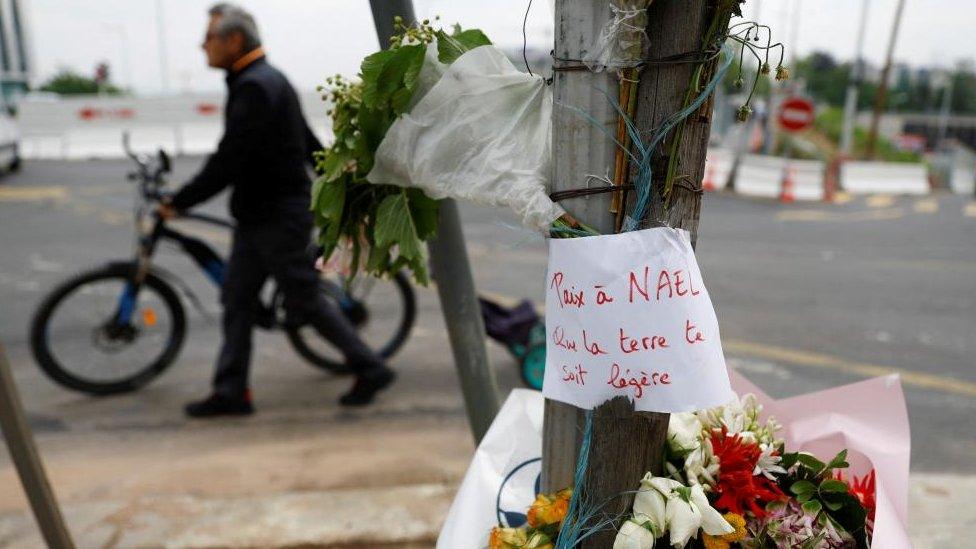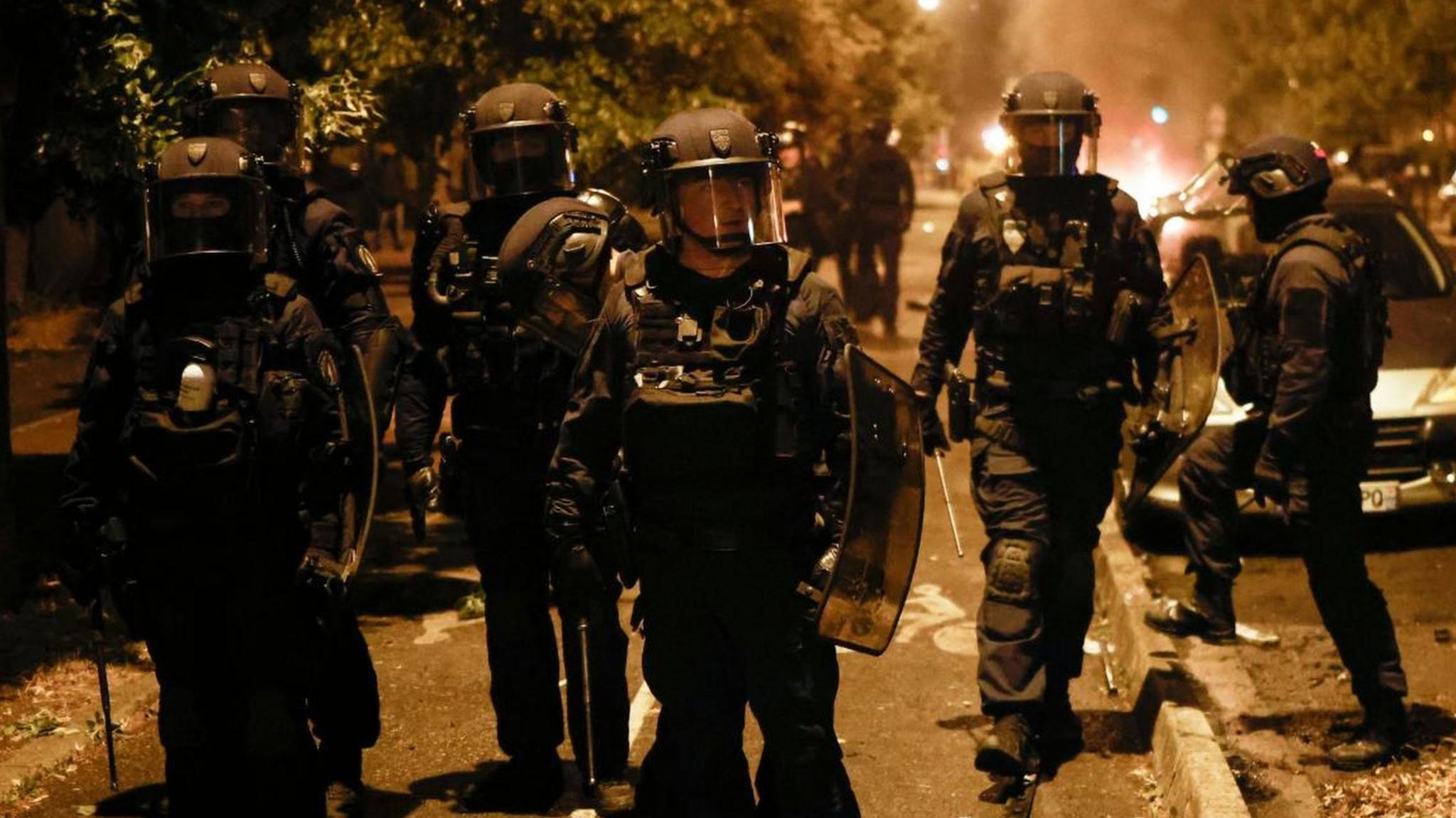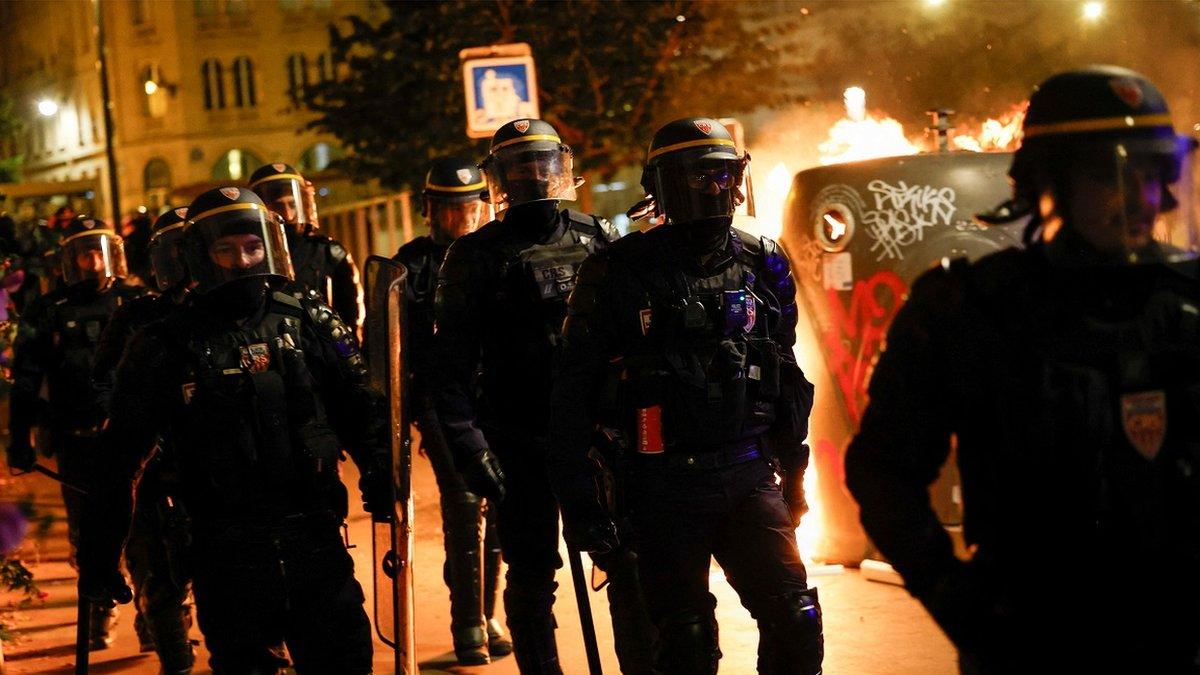France shooting: Who was Nahel M, shot by French police in Nanterre?
- Published
Watch: 'They've taken my baby' - Mother of teen shot by police
The killing of Nahel M, 17, has sparked riots in cities across France as well as the town of Nanterre to the west of Paris where he grew up.
An only child brought up by his mother, he had been working as a takeaway delivery driver and played rugby league.
His education was described as chaotic. He was enrolled at a college in Suresnes not far from where he lived, to train to be an electrician.
Those who knew Nahel, who was of Algerian descent, said he was well-loved in Nanterre where he lived with his mother Mounia and had apparently never known his father.
His record of attendance of college was poor. Nahel had been in trouble before and was known to police, but family lawyers stressed he had no criminal record.
He had given his mother a big kiss before she went to work, with the words "I love you, Mum".
Shortly after nine in the morning on Tuesday he was fatally shot in the chest, point-blank, at the wheel of a Mercedes car for driving off during a police traffic check. At 17 he was too young for a licence.
"What am I going to do now?" asked his mother. "I devoted everything to him," she said. "I've only got one, I haven't got 10 [children]. He was my life, my best friend."
His grandmother spoke of him as a "kind, good boy".
"A refusal to stop doesn't give you a licence to kill," said Socialist Party leader Olivier Faure. "All the children of the Republic have a right to justice."
Watch: What social media videos reveal about Paris teen's death
Nahel had spent the past three years playing for the Pirates of Nanterre rugby club. He had been part of an integration programme for teenagers struggling in school, run by an association called Ovale Citoyen.
The programme was aimed at getting people from deprived areas into apprenticeships and Nahel was learning to be an electrician.
Ovale Citoyen president Jeff Puech was one of the adults locally who knew him best. He had seen him only a few days ago and spoke of a "kid who used rugby to get by".
"He was someone who had the will to fit in socially and professionally, not some kid who dealt in drugs or got fun out of juvenile crime," Mr Puech told Le Parisien.
He praised the teenager's "exemplary attitude", a far cry from what he condemned as a character assassination of him painted on social media.
He had got to know Nahel when he lived with his mother in the Vieux-Pont suburb of Nanterre before they moved to the Pablo Picasso estate.
Shortly after his death an ambulance man, Marouane, launched a tirade against a police officer, explaining later that he knew the boy as if he was his little brother. He had seen him grown up as a kind, helpful child. "He never raised a hand to anyone and he was never violent," he told reporters.
His mother believes the police officer who shot him "saw an Arab face, a little kid, and wanted to take his life". She told France 5 TV she blamed only the one person who fired the shot, not the police: "I have friends who are officers - they're with me wholeheartedly."
"May Allah grant him mercy," read a banner unfurled over the Paris ring road outside Parc des Princes stadium.

Flowers were left at the site where Nahel died
"Police violence happens every day, especially if you're Arab or black," said one young man in another French city calling for justice for Nahel.
But the family's lawyer, Yassine Bouzrou, said this was not about racism, but about justice.
"We have a law and judicial system that protects police officers and it creates a culture of impunity in France," he told the BBC.
Nahel had been the subject of as many as five police checks since 2021 - what is known as a refus d'obtempérer - refusing to comply with an order to stop.
When he was stopped by police, he was driving a Mercedes with Polish number plates, with two passengers and no licence.
As recently as last weekend, he had reportedly been placed in detention for refusing to comply and was due to appear before a juvenile court in September.
His name was on a police file called a Taj, used by authorities for a variety of investigations.
Last September a judge imposed a "disciplinary measure". Most of the trouble he got into involved cars: driving without a licence or insurance and using false number plates.
But Nahel had never been convicted, said family lawyer Jennifer Cambla, and had no criminal record. Being known to police was not the same as a criminal record, because he had never been tried for anything listed on his police file, she told French TV.
"I think in this kind of suburb it's pretty rare that a young person hasn't been stopped by police or hasn't been in custody," Ms Cambla said.
The riots that his death has provoked are a reminder for many in France of the events of 2005, when two teenagers, Zyed Benna and Bouna Traoré, were electrocuted as they fled police after a game of football and ran into an electricity substation in the Paris suburb of Clichy-sous-Bois.
"It could have been me, it could have been my little brother," a Clichy teenager called Mohammed told French website Mediapart.
Related topics
- Published29 June 2023

- Published29 June 2023
